#manorialism
Explore tagged Tumblr posts
Text
Need to go on a rant about the feudal system (more specifically manorialism) and Gideon the Ninth (spoilers through Harrow the Ninth ahead)
Gideon is very specifically described as living in a feudal system in the Ninth house. She is a Serf. She lives and serves under a ruler, she has specific legal, social, and economic obligations to the House and its ruler as a result of this system.
Feudalism exists within a specific sociopolitical context. It’s not equivalent to slavery, though it can appear that way to a modern audience. Muir wouldn’t have picked the term “serf” to describe Gideon if she didn’t mean it, or if she meant something else (such as slavery or indentured servitude)
Serfdom is not ownership of an individual, like in slavery. It’s more like an intense landlord/employee relationship, if we’re looking for a modern touch point. A serf is bound to the land they live and work on because they are a valuable source of labor. They owe labor, goods, or a payment in equivalency to, the lord who runs the lands they are bound to. If they want to go elsewhere, they have to pay back the lord for what labor/goods they won’t be providing anymore, and the lord could refuse them.
Because this is also a reciprocal relationship, the lord also has certain responsibilities to the serfs, including protection, the maintenance of the law, and maintenance of the lands. The lord runs their holdings as ruler, but also can’t just do whatever they want. This is a social, economic, and political system, if people didn’t like it or benefit from it and had the capability to do so, they would rebel.
(Sorry for this long tangent. It’s important to set context and also discuss this history. Feudalism/Manorialism looked different in different places and times, and originally came from Roman villa systems, but this post is already long enough)
So what does this have to do with the locked tomb?
Gideon is a serf, very explicitly. She is also a ward, which puts her into an interesting spot when it comes to legal and financial responsibilities. This means she owes labor and fealty to the Ninth, essentially in repayment for raising her.
When she tries to head to the Cohort, she would otherwise be allowed to do that as a free citizen of the Ninth House. But, she has prior responsibilities to the House as a serf, so she would need the Lord’s (Harrow’s) permission to do so. Despite these obligations, she is not required to do any particular jobs in the Ninth. She is not forced to be a nun, or to do labor. From what is described, it seems like she’s relatively left to her own devices.
In a system of slavery, Gideon would be forced to enact specific labor, to learn a specific trade, and to generally do whatever the fuck Harrow or the Reverend family wanted. But she’s not.
Again, Gideon can train to join the cohort as much as she wants. She can lock herself in her room and avoid people as much as she wants. She can avoid prayers or choose to go to them. She can do what she wants, but she is not allowed to leave to take her labor elsewhere without authorization, because of her legal and financial obligations in this sociopolitical system.
Ortus puts it very well in Harrow: he must follow her orders and fulfill the responsibilities he socially is obligated to fulfill, but when he lays his head down at night he is allowed to feel however he wants about himself and his actions, he is still a free person. Ortus is in a slightly different situation as his position at birth obligates him to be Harrow’s Cavalier, as opposed to Gideon who is in a lower social position and is the only option left, but he still owes a large amount of loyalty and labor to the Ninth House.
(Sorry again this is so long. I repeat myself quite a bit. But I saw someone say that Gideon is Harrows slave and that is a misconception that brushes over a lot of the complexities of the books. The relationship is complicated and full of social dynamics that we don’t see as modern readers because there are so many layers that require historical context. This is also not a defense of the feudal system or to say that their relationship isn’t toxic. It is. But that’s a different post)
#the locked tomb#gideon the ninth#harrow the ninth#harrow the ninth spoilers#harrowhark nonagesimus#gideon nav#ortus nigenad#feudalism#manorialism#historical context is fucking important my guys#tasmuir is using very specific parallels to the real world#tlt meta#rants n rambles#gideon the ninth spoilers
310 notes
·
View notes
Photo

July, Les Tres Riches Heures
A medieval manuscript illustration depicting the work on an agricultural estate during the month of July. From 'Les Très Riches Heures du Duc de Berry', c. 1412-1440 CE. (Condé Museum, Château de Chantilly, Oise, France)
Image by Limbourg Brothers
555 notes
·
View notes
Note
Did nobles interact with commoners regularly, and if so did they do so outside formal sessions? For instance would nobles leave their manors and engage one to one, or was this likely to end in violence?
I've actually written quite a bit about this: it was considered to be an important part of a noble's political education for them to learn how to "condescend" gracefully to the commons without either being overly "familiar" or "giving insult." It's a bit like how we expect modern politicians to be very good at surface level social interaction - shaking hands, kissing babies, remembering people's names, etc.
A nobleman who couldn't do that - John of Gaunt was famous for being utterly crap at it - would get a bad reputation as overly proud (in one direction) or obsequious.
#estate management#manorialism#manor house#nobility#smallfolk#medieval politics#medieval culture#medieval cultural politics
80 notes
·
View notes
Text

24 Days of Gift-Giving: Ten Titles
(This is December 10th’s prompt! Posting yesterday’s & today’s later!)
Happy December, everyone!
So, @creativepromptsforwriting is doing a writing thing called “24 Days of Gift-Giving” where each day of December has a prompt, so I figured it would be fun to write something up for each prompt! Feel free to participate too, if you’d like! It could be a fun writing game!
Like usual, I will be doing these for the characters of my story Romance The Backrooms, a liminal space otome with 5 main love interests.��
Today’s Prompt: Ten Titles (… creative titles for your next story); Burying our memories
Characters: Uri & Manorial
Other Info: URI ANGST URI ANGST URI ANGST! If you don’t know about Uri & Manorial, here’s the basic gist: Manorial is an entity known as a Memory Collector, who attaches to people and trades near-unlimited power in exchange for memories.
__________
When possible, Uri tried to sacrifice insignificant memories. What he ate for breakfast the other day. Things he thought about when he was bored. Stuff like that.
But sometimes, Manorial wanted more. “Sorry, idle thoughts like that aren’t going to cut it for me, Uri,” the cat would purr with a laugh. “If you want my help, I need something more . . . substantial.”
So, he would give memories that were more significant, trying to keep the others informed on what memory he was sacrificing. If he was lucky, it was something one of the others in the group was there for, and they could fill him in on what had happened later. Bring back the memory through their own experiences.
But other times, Manorial would ask for a memory only he & Uri was there for. Something nobody else had witnessed, and therefore, nobody else could bring back for him.
And Uri would give the memory. What choice did he have? Burying a memory in exchange for power—surely, it had to be worth it.
Right?
@creativepromptfills
#24 days of gift giving#romancethebackrooms#uri rtb#manorial rtb#angst#light angst#short story#creative writing#writeblr#writing#writers on tumblr#writing prompt#writers#writer#writers and poets#writing prompts#prompt#fiction
3 notes
·
View notes
Text












Scenes seen while cycling
2 notes
·
View notes
Text
Why Choosing Rubel Villa Is The Best Option For Your Next Family Vacation?
When planning the perfect family vacation, finding the right accommodation is pivotal in ensuring everyone has a great time. Villa Near The Uttan Gorai Beach provides a perfect balance of comfort, privacy, and proximity to nature, making it an ideal choice for families seeking a memorable beach getaway. Here’s why choosing Rubel Villa is the best option for your next family vacation:

Ample Space for the Entire Family: Unlike hotel rooms, our villa offers spacious living areas, multiple bedrooms, and private outdoor spaces, ensuring that each family member has their own space to relax and unwind. With a living room, kitchen, and sometimes even multiple bathrooms, we allow families to stay together in comfort without feeling cramped.
Privacy and Relaxation: One of the main advantages of staying in a villa is the privacy it offers. Unlike crowded hotels, villas provide a quiet, secluded environment where your family can enjoy peace and tranquility. Whether you’re lounging by the pool, having a barbecue in the garden, or simply enjoying a private walk along the beach, the villa setting ensures that your family can relax without distractions.
Convenient Home-Like Amenities: Our villa is fully equipped with home-like amenities, such as kitchens, laundry facilities, and spacious dining areas. This makes it easy for families to cook their meals, saving money and ensuring that everyone can enjoy their favorite home-cooked dishes. With the ability to prepare meals, you can also accommodate specific dietary preferences, making it ideal for families with children or anyone with food restrictions.
Close to Nature and Adventure: Gorai Beach is known for its serene environment and natural beauty, providing families with plenty of outdoor activities to enjoy together. From beach walks and swimming to water sports like kayaking and jet skiing, there’s something for everyone. Staying in a villa near the beach means you’re just a short walk away from all the fun activities, giving you easy access to the sand, sea, and adventure.
Book the Villa In Gorai And Manori Nearby today with us and enjoy your stay.
Credit:- https://rubelvilla01.blogspot.com/2025/02/why-choosing-rubel-villa-is-best-option-for-your-next-family-vaca.html
0 notes
Text
Find Your Dream Home at Mahagun Manorial Noida - Property Network India Pvt. Ltd.

Looking for a luxurious home in Noida? Mahagun Manorial Noida offers an array of stunning flats in Sector 128, Noida, with excellent connectivity and modern amenities. Choose from spacious 2BHK and 3BHK flats and enjoy the high-end lifestyle in a prime location. Don't miss out on this opportunity to own a flat at Mahagun Manorial. Contact Property Network India Pvt. Ltd. today and book your dream home at Mahagun Manorial Sector 128 Noida.
#Mahagun Manorial Noida#Mahagun Manorial Sector 128#Mahagun Manorial Sector 128 Noida#Kalpataru Vista Sector 128
1 note
·
View note
Text
So, the thing about Don Quixote.
The thing about Don Quixote is that he tilts at windmills - tilts in the archaic sense of ‘charge at with a lance,’ because it’s the story of a guy who read so much chivalric romance that he lost his mind and started larping as a knight-errant. He was, if you’ll pardon the phrasing, chivalrybrained.
The thing about Don Quixote is, sometimes people take it as this story of whimsical and bravely misguided individualism or ‘being yourself’ or whatever, and they’re wrong. If it took place in the modern day, Don Quixote would absolutely be the story of a trust fund kid who blew his inheritance being a gacha whale until his internet got cut off so now he wanders around insisting that people refer to him as ‘Gudako.’
But the real thing about Don Quixote is that it was published in the early 1600s, and the thing about the 1600s is that Europe was one big tire fire. This is because 1600s Europe was still organized around feudalism (or ‘vassalage and manorialism’ if ya nasty), which assumed that land (and the peasants attached to it) were the only source of wealth. And that had worked just fine (well, ‘just fine,’ it was still feudalism) for a long time, because Europe had been a relative backwater with little in the way of urbanization or large-scale trade.
That was no longer true for Europe in the 1600s. The combination of urban development, technological advances, and brutal Spanish colonialism meant that land was no longer the sole source of wealth. Sudden there was a new class of business-savvy, investment-minded upwardly-mobile commoners, and another new class of downwardly-mobile gentry who simply couldn’t compete in this new fast-paced economy. Cervantes saw this process with his own eyes.
One of the symbols of this new age was the windmill, a complicated piece of engineering that was expensive to build but would then produce profits indefinitely - in other words, a windmill was capital.
The thing about Don Quixote is, when he tilts at windmills, he has correctly identified his nemesis.
19K notes
·
View notes
Text
Sukuna's Backstory Theory (+ mini Uraume Backstory Theory)
While we wait for jjk ch 265 leaks, I hope you enjoy reading this post of mine in the meantime.
Please note that this is just my theory. Also, Sukuna deserves to die.
Now enjoy your reading.
WARNING: MANGA SPOILERS UP TO CH 264; subject covers the following sensitive topics: sacred s*x, cannibalism, homosexual relationships; mentions or implications of abuse

Beginning:
We know from Sukuna himself in chapter 237 that he was an 忌み子 - a taboo child. In ancient and medieval Japan, a taboo child is a child that is ostracized, unwanted, and discarded.

JJK CHAPTER 237
As mentioned by Sukuna, he himself 'consumed' his twin to survive and had presumed that his 'foolish mother' (愚母 - he wasn't looking down on her, calling her stupid, but instead he was humbly referring to her) must have been starving.

JJK CHAPTER 257
Prominent families during that time were the Fujiwara, Sugawara and Abe clans. For sure, he wasn't born a noble, but rather a commoner, or worst, a slave. He must've been born with weak or below average CE, too, aside from his four arms, four eyes, and the second face.
It was probably only him and his mother in the beginning and she was the only one taking care of him. Given their supposed circumstances, Sukuna must've started working by the time he was around 5 or 6. Plus, if I were to guess where they would've lived, it would be in the agricultural lands of a Buddhist-Shinto temple. In Heian era, Buddhism and Shinto co-existed together (shinbutsu-shuugoo) so it's not strange to find Buddhist temples to have at least one small shrine dedicated to a kami (a Shinto god/goddess) [these are calles jisha (寺社)] and Shinto shrines accompanied by Buddhist temples in mixed complexes [these are called jinguuji (神宮寺)].
In addition, these institutions had these manorial estates called, shooen (荘園), which were "any of the private, tax free, often autonomous estates or manors...... developed from land tracts assigned to officially sanctioned Shintō shrines or Buddhist temples or granted by the emperor as gifts to the Imperial family, friends, or officials." In the case of shrines and temples with shrines in them, they are called mikuri (御厨), which means a god's/goddess' kitchen.
The Chinese characters for mikuri are the same as the first two letters of Sukuna's CT (御厨子). In the beginning, mikuri only referred to the place where shrine offerings/sacred food (fish, vegetables, etc.) were cooked, but it eventually also included the land or property where they get the offerings from and prepare them in the meaning. Plus, the citizens of these lands/properties were called "gods' & goddesses' people" (神人, shinjin), and these mostly consisted of the producers (fishermen, farmers, etc.). We can definitely infer that Sukuna has most likely worked in the cooking area of the mikuri, the 御厨子所 (mizushidokoro, a kitchen for the upper classes and the shrines and temples) Think about it, not only does he use words related to consuming, but he also referenced fish-related words.

JJK CH 224 - "A fish who merely has no name attached to it."

JJK CH 216 - "卸す" - to grate (e.g. vegetables); to cut up fish "三枚に卸す” - to cut you into three slices (fillet)

JJK CHAPTER 8 - "おろした" - past tense verb of 卸す "三枚におろした” - cut you into three slices (fillet)
(light blue is just to cover watermarks)
In Heian era, meat was forbidden except for some parts in Japan where hunting was really common (except for aristocrats and monks lowkey - they do eat them at times, especially when they fall sick). Fish was temporarily banned but was eventually lifted. So, majority of the Japanese people during this time period didn't eat meat with the exception of fish and other seafood. Moreover, when cooking the shrine offerings, the only meat they cooked was seafood. Plus, if he and his mom was in one of the shrine and temples in Heian-kyoo (present-day Kyoto), then chances are he had to cook for festivities and rituals in the imperial palace.
But then, how did he learn to read and write? The only one who were literate were the imperial family, aristocrats, Shinto priests, Buddhist monks, and anyone else related to religious institutions and higher rank than commoners. So the only available ways for him to have access to learning kanji (漢字 - Sino-Japanese characters) and even kana (hiragana and katakana) was to become an apprentice monk or priest. But I believe he became a Buddhist apprentice monk since it is more open than becoming a Shinto priest.
If he had started as a worker in the mikuri, he would have been secretly listening to the lessons between an apprentice and the older monk. Then, if he managed to prove his talent, he could have become an apprentice. If he were an apprentice monk, he would have to learn directly from an older monk. This would not stop him from working as a kitchen worker since he would have to help with preparing offerings and cooking for important occasions and guests.
As an apprentice, he would have learned everything about Buddhism, including how to preach to people. Unfortunately, there was a cost to this. It was the nanshuudou, the homosexual practice between a prepubescent apprentice monk and an older adult monk, which is heavily documented in Edo period but a practice that has been ongoing in the Shinto priest apprenticeships and eventually in Buddhist monk apprenticeship, as well. Mind you, this is not a practice between male lovers, but of loyalty and the first step to 'reaching enlightenment'. I think of it as a pseudo-sacred s*xual relationship. It is something expected at that time, but it may not have been a great experience for Sukuna. He was a taboo child, meaning even those older monks most likely made this harsher than it already was. Not to mention, he might have been as young as 7 or 8 years old when this all happened.
This was also sort of thought of by a JP theorist, according to this twitter user.
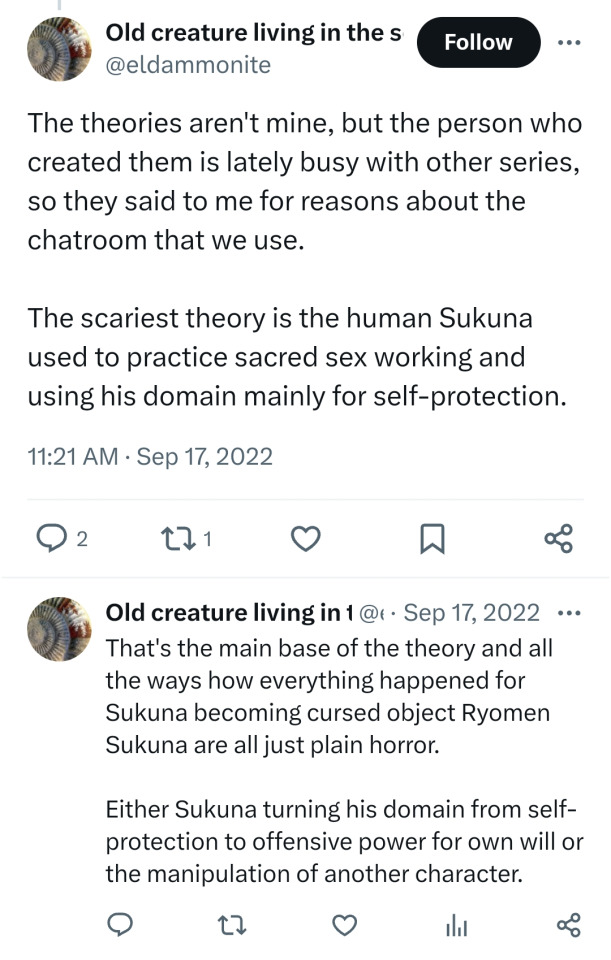
Anyways, let's move on from this sensitive topic.
You might be wondering why do I think he had been an apprentice monk and a cook? Well, mizushi (御厨子) also has these meanings.
Zushi (厨子) originally was a word for storage boxes for utensils and ingredients in the kitchen, then extended into becoming a storage for personal stuff and a decoration as well for aristocrats.
Zushi also extended to becoming a storage for Buddhism relics, scrolls or anything important. This includes the Buddhist altars. Thus becoming Mizushi, sacred storage.
Additionally, as an apprentice monk, he would be able to interact with nobility more. Buddhism was intertwined with the court politics in Heian era. This is more prominent when court officials and even the imperial family members, including the Emperor, would retire as Buddhist nuns or monks. Plus, there would also be visits by the officials and probably he was able to see or receive letters and poems from them. It would be inevitable that he learns them to communicate effectively.
This would also makes sense as he knew Tengen, who was an avid supporter of Buddhism.
Career as a Sorcerer:
In an era where the Fujiwara clan ruled supreme, leaving barely any crumbs for other aristocratic clans to take spots in the political arena. So, in order to consolidate their own power, many other clans (including the minor/weak branch families of the Fujiwaras) and Imperial princes went to obtain their own land outside of Heian-kyoo (present-day Kyoto) and even their own army. That's why these clans have armies of their own, especially those full of sorcerers. I won't be surprised if they took in anyone who has curse energy and trained them, just like what the Fujiwaras did with Uro.
So, I believe that someone noticed his cursed energy and his potential, then took him for training. Then obviously he would have met other Heian-era sorcerers. Here are my two cents on this:
I would like to believe that Tengen trained him as she was also an avid supporter of the religion, and he eventually met Kenjaku as they're 'friends' with her. Being a jujutsu sorcerer apprentice meant quitting or being part-time in his apprenticeship from the Buddhist Temple. (But I wonder if this would have stopped the pseudo-sacred s*x stuff.......) However, I'm open to the fact that it might have been another sorcerer who trained him (or there has been another one besides Tengen and Kenjaku who did so or influenced him) due to the name of his extension technique 'Divine Flames, Open'
One of the opposing factions (either the Sugawara, Tachibana or Abe clan) to the Fujiwara hired him in their order to put them in check. I'm leaning more towards the Sugawara clan.
This was probably the time when he probably met Angel from Abe clan, Uro from the Fujiwara, and especially Uraume. I'll explain how Uraume is related to the Sugawaras in a bit.
Sukuna served as part of Sugawara's troops or something like that. This can also be the point where he learned more about Japanese art and culture at the time.
One of the curses he must've fought was Yamata no Orochi.
Sukuna betrayed the Sugawaras and destroyed its army of sorcerers, with a few survivors left. Uraume decided to dedicate their whole life to him and followed him from then on.
He officially became a curse user and wrecked havoc in Japan, especially Heian-kyoo
Angel got enraged from his acts and with the permission of the Abe clan and the remnants of Sugawara clan, they jumped on Sukuna but lost.
Later on, he defeated the Fujiwara army led by Uro.
How is Uraume related to the Sugawaras?
There's this video from JP channel that was theorizing about Uraume when they first appeared in Shibuya arc a couple years ago that they used to be trapped in the prison realm before being freed so that Kenjaku can use it for Gojo Satoru and it was time for Sukuna's resurrection but this was obviously debunked, but there was something interesting that the creator brought up - the Tobiume.
Have you heard about The Legend of the Flying Plum (飛梅伝説)? So basically, when Sugawara no Michizane was demoted in ranking because of the Fujiwaras and was exiled, he wrote a poem expressing his sorrow of not seeing his precious plum tree in his residence in Heian-kyo (present-day Kyoto) ever again. Then from this, a romantic legend came about, where the plum tree was so fond of its master and cannot bear to be apart from him that it finally flew to Dazaifu, where he was exiled to, and that tree became known as tobi-ume (飛梅, 'the flying plum').
Michizane loves plum trees and plum blossoms, so it won't be strange if there were people in the clan named after plum blossoms or plum. In my case, I believe that Uraume is related to the Sugawara clan, but their status in the clan itself wasn't great. We can assume from their name in kanji, 裏梅.
裏 means the following:
opposite side; bottom; other side; side hidden from view; undersurface; reverse side
rear; back; behind
in the shadows; behind the scenes; offstage; behind (someone's) back
梅 means plum
Though they may have been born from a noble, prestigious clan, they remained in the shadows. My theory is that, for whatever reason it may be, Uraume's life wasn't as good as before Sukuna allowed them to serve him. They might have been an illegitimate child or they might have some deformity we don't know of, or whatever. Then they met Sukuna and the rest was history.
Do you not believe that Uraume is not related to the Sugawaras?
Let me show you a picture of the Sugawara clan crest.

They call this umebachi. A plum blossom crest.
And what's in Uraume's name? Ume (梅) - plum.
Another thing here that fulfill its name is the fact that Uraume is Sukuna's servant. Just like the tobiume, they follow their master from behind and cannot bear to be apart from him.
'Divine Flames, Open':
Here's something that caught my attention.
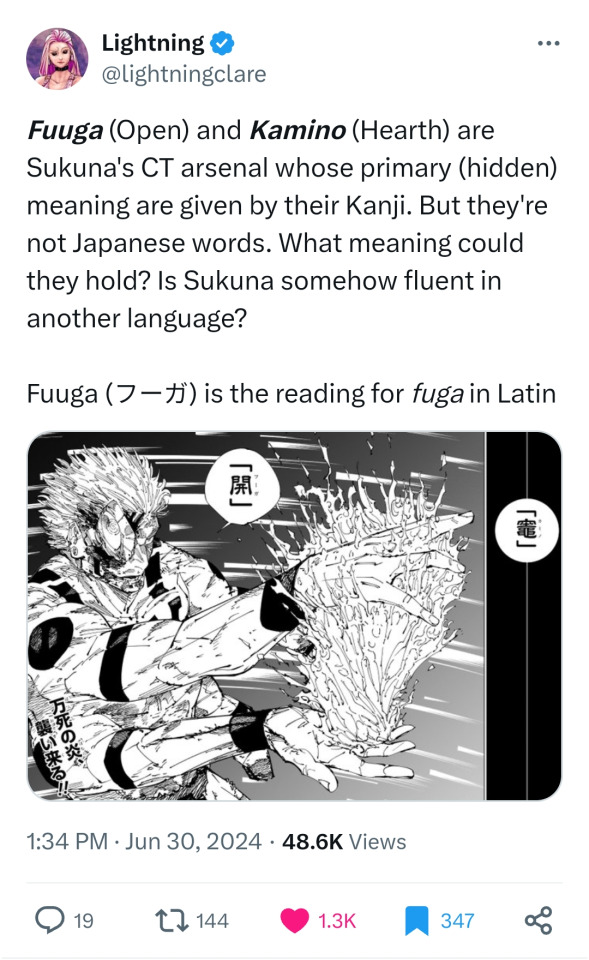
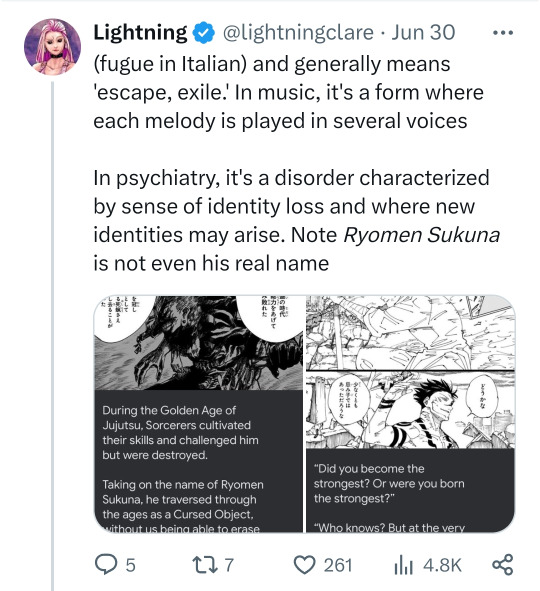
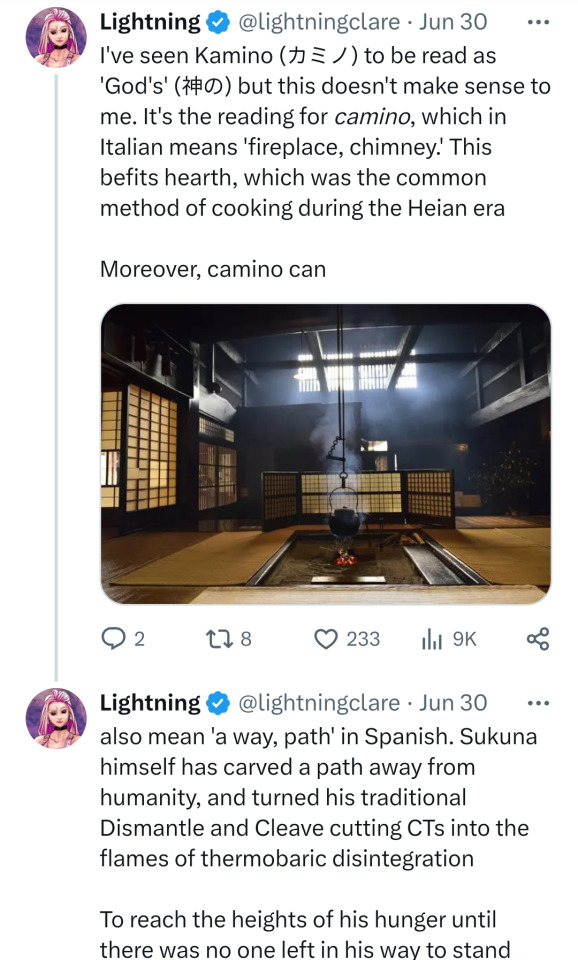
Kamino (カミノ) has the kanji 竈, that is originally pronounced as kamado. It means traditional Japanese wood or charcoal-fueled cook stove. Fuuga (フーガ) has the kanji 開, originally pronounced as kai, meaning open. Now everything else is purely Japanese except these two.
Kamino and fuuga originated from Latin and Ancient Greek, and both exist in the Romance languages. How tf is he using these words? Around Heian era, only the Eastern Roman Empire is standing and the main language there was Greek....... but that's around present-day Turkey and its surroundings. The furthest they reached in trade was China...... oh wait, Heian era Japan still traded with China........
Seems like that theory of Chinese sorcerer isn't far-fetched, eh?
(But fr tho, do you think he met someone from Byzantine? There's no confirmation time travel is a thing so that's the only possible explanation)
Cannibalism:
Cannibalism, believe it or not, was practiced in China from Tang Dynasty and onwards. Remarkably, Heian era's last major Chinese contact was with Tang Dynasty. Records of cannibalism must have been brought from Tang Dynasty China along with Buddhism and other things by monks who were sent to China by the government.
It was said that human flesh of a young person was a great medical treatment for illnesses. So there would be young people, especially females, sacrificing some of their flesh for the sake of their parents or parent-in-laws recovery. Furthermore, Emperors, e.g. Wuzong of Tang, supposedly ordered provincial officials to send them "the hearts and livers of fifteen-year-old boys and girls" when they had become seriously ill, hoping in vain this medicine would cure him. Later on, private individuals sometimes followed their example, paying soldiers who kidnapped preteen children for their kitchen.
There was also something called war cannibalism, in which victors in a battle, war, or conflict would eat the dead enemy's flesh as "official punishments and private vengeance", as well as "celebrating victory over them."
Therefore, I propose that Sukuna started cannibalism as a way to treat an illness or disease - in private obviously since in Heian era, meat other than seafood was banned and meat that becomes available for special occassions or circumstances like falling sick are reserved for the upper class, plus if he ever was an apprentice monk, he would not have been allowed to consume meat. Since Heian era had outbreaks, such as smallpox, and also common diseases, anyone can get it, including him. So, not wanting to die, he resorted to this. But then it eventually became a habit that also extended to eating people he defeated in battles and young people and women for medicinal and nutritional purposes later on. This is the most likely the reason why in the first chapter, he was looking for children and women.
But if he had contracted some sort of illness or disease at some point in his youth and cannibalism (obviously) wasn't a cure for it, how would he have survived it and lived longer? Perhaps it might have to do with Tengen - who knows if she could have an extension technique of her Immortality CE, where she could have extended his lifespan. It could have had to do with Kenjaku; with their vast knowledge, it's possible he offered a solution to him. However, I'm leaning more towards Tengen helping him in this regard. It was also probably the reason why she ended up having four eyes and all because of this. But, of course, he couldn't escape death, so he agreed to Kenjaku's terms and became cursed objects to reincarnate later on.
My second proposition is that Sukuna was maltreated and the people didn't bother sharing meager amount of food available to him. We know that because of the Fujiwara family's political monopoly in the capital as well as the distribution of the land to nobility made it possible for them to abuse their power. For instance, these lords imposed taxes in an unreasonable amount to fund their lavish lifestyle, which obviously made life hard for the peasants and slaves since goods such as silk, grains and food became a common medium of exchange when the currency fell. So you can imagine how much they had to give up just to pay their taxes. This definitely made their food supply low. I can also imagine Sukuna was blamed for misfortunes and misery they have experienced because of his status as a taboo child. I don't think they would provide him food and so he would have to rely on dead people to survive.
And assuming that we're going off with this proposition instead of the other one, I think the reason why Sukuna was seeking women and children because in the past, it was more common for children and women to die. Children are naturally more vulnerable and women die easily, especially during childbirth. I'm certain that the most common corpses or bodies he must've found were those of children and women. But, of course, eventually he began to crave humans because he got so used to it that normal food didn't satisfy his hunger any longer - not that cannibalism fully resolved it, though.
The Fallen:
(I'm not gonna lie, majority of what I would say here are more assumptions based on Geto's and a bit of Yuji's acts)
Everyone has been comparing Sukuna and Gojo, seeing them as foils and parallels. I acknowledge that they are similar to each other and whatnot. But what if I tell you that he could've gone through an experience or two similar to Geto?
Think about it. Wouldn't you consider Geto as a 'Fallen One'? He was a righteous man, whose goal is to protect the weak as a strong person. But after the Toji incident, his moral convictions and purpose has been questioned by himself, and eventually, he fell from grace - being stripped of his status as a jujutsu sorcerer and thus becoming a curse user. He had the same values but they were reinterpreted and twisted.
If my theory on Sukuna being educated at a Buddhist Temple is true, then he must have believed in the salvation of those who are suffering (like Yuji to some extent), but was corrupted along the way. He had the same ideals, but it became reinterpreted and twisted. I think the reason why he hates Yuji because he is seeing all those he threw away to gain freedom and absolute strength in jujutsu in him. Both of them are inverses of each other, and it's not a surprise if Yuji is the representation of the old Sukuna.
I mean if you look at nobility back in Heian era, they kept indulging themselves in leisure and pleasure to the point that they neglected the economy. Literally the currency fell and all those bureaucratic and admin work fell mostly to lower classes working in each ministry. Basically back then, the higher you were in the hierarchy, the more pleasure you could attain and keep chasing for. How else did you think Japanese art, literature and culture came to be during this era? This was where he probably learned about hedonism or what influenced him to be one.
Not to mention, people who would've taken advantage of him for their pleasure, curiosity, greed and personal gains, power and control, and many more reasons. He could have been like Geto and Yuji, who exorcise curses and help the weak. There was a turning point where he decided to let go of everything and walk the path that he has been in for the last 1000 years.
I am not surprised if he decided to be who he is today as a revenge to the world, a response to the trauma and suffering he went through just like Geto.
If I am right about Sukuna going through a similar experience as Geto did, then this page below brings a whole new meaning to the Gojo vs Sukuna fight on December 24, 2018 - the death anniversary of Geto:

JJK CH 223
But despite all of these, there's one thing we can agree on - that is, he became the monster the world sees him as in the end.

That will be it. I hope y'all like it to some extent. Until then.

References:
Heian Era, Buddhism, 御厨子 -related Topics:
https://en.m.wikipedia.org/wiki/Sh%C5%8Den/
https://ja.m.wikipedia.org/wiki/%E5%BE%A1%E5%8E%A8
https://en.m.wikipedia.org/wiki/Buddhist_temples_in_Japan
https://www.britannica.com/place/Japan/The-Heian-period-794-1185
https://www.colorado.edu/ptea-curriculum/imaging-japanese-history-1
https://ja.m.wikipedia.org/wiki/%E5%8E%A8%E5%AD%90
https://en.m.wikipedia.org/wiki/Sugawara_no_Michizane
https://en.m.wikipedia.org/wiki/Heian_period
https://www.colorado.edu/ptea-curriculum/imaging-japanese-history-1
Homosexuality in Medieval Japan:
https://www.tofugu.com/japan/gay-samurai/
https://ida.mtholyoke.edu/items/19c86409-c129-46a1-927b-11cfe0ffb1c3
Cannibalism & Sacred S*x-related Topics:
https://en.m.wikipedia.org/wiki/Human_cannibalism
https://en.m.wikipedia.org/w/index.php?title=Medical_cannibalism&diffonly=true
https://en.m.wikipedia.org/wiki/Cannibalism_in_Asia
https://en.m.wikipedia.org/wiki/Sexual_ritual
https://en.m.wikipedia.org/wiki/Sacred_prostitution
Ancient Greek, Latin, & Roman Empire Topics:
https://en.m.wiktionary.org/wiki/fuga
https://en.m.wiktionary.org/wiki/caminus
https://en.m.wiktionary.org/wiki/camino
https://en.m.wikipedia.org/wiki/Sino-Roman_relations
YouTube Videos I Referenced:
https://youtu.be/5n24Ulc8u84?si=Nngbg4xEqyNu82x8
https://youtu.be/WhBN29CIuAQ?si=5bNryoT-GzleIGq9
Reddit Posts I Referenced:
https://www.reddit.com/r/Jujutsushi/comments/1bngk9x/i_solved_one_of_the_great_mysteries_of_the_heian/
https://www.reddit.com/r/AskHistorians/comments/ztay5e/what_foreign_countries_did_japan_have_trade/
https://www.reddit.com/r/AskHistorians/comments/zs4k9p/what_was_life_like_for_the_average_people_heian/
Twitter Posts I Referenced:
https://x.com/eldammonite/status/1571157320570380295
https://x.com/lightningclare/status/1807467771913269374
#jjk#jjk manga#jjk meta#jjk sukuna#sukuna#ryomen sukuna#sukuna ryomen#uraume#jjk uraume#jujutsu kaisen manga#jujutsu kaisen#jujutsu geto#jjk geto#gojo satoru#geto suguru#jjk spoilers#jujutsu sukuna#jjk 265
193 notes
·
View notes
Text
The antitrust case against Apple
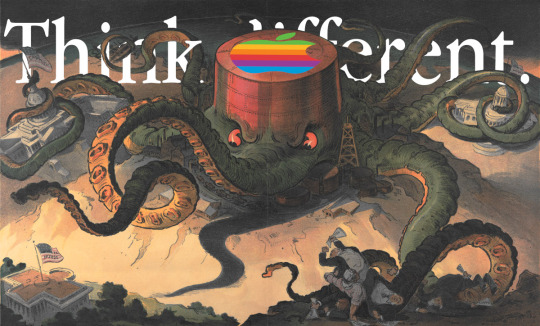
I'm on tour with my new, nationally bestselling novel The Bezzle! Catch me TONIGHT (Mar 22) in TORONTO, then SUNDAY (Mar 24) with LAURA POITRAS in NYC, then Anaheim, and beyond!

The foundational tenet of "the Cult of Mac" is that buying products from a $3t company makes you a member of an oppressed ethnic minority and therefore every criticism of that corporation is an ethnic slur:
https://pluralistic.net/2024/01/12/youre-holding-it-wrong/#if-dishwashers-were-iphones
Call it "Apple exceptionalism" – the idea that Apple, alone among the Big Tech firms, is virtuous, and therefore its conduct should be interpreted through that lens of virtue. The wellspring of this virtue is conveniently nebulous, which allows for endless goal-post shifting by members of the Cult of Mac when Apple's sins are made manifest.
Take the claim that Apple is "privacy respecting," which is attributed to Apple's business model of financing its services though cash transactions, rather than by selling it customers to advertisers. This is the (widely misunderstood) crux of the "surveillance capitalism" hypothesis: that capitalism is just fine, but once surveillance is in the mix, capitalism fails.
Apple, then, is said to be a virtuous company because its behavior is disciplined by market forces, unlike its spying rivals, whose ability to "hack our dopamine loops" immobilizes the market's invisible hand with "behavior-shaping" shackles:
http://pluralistic.net/HowToDestroySurveillanceCapitalism
Apple makes a big deal out of its privacy-respecting ethos, and not without some justification. After all, Apple went to the mattresses to fight the FBI when they tried to force Apple to introduced defects into its encryption systems:
https://www.eff.org/deeplinks/2018/04/fbi-could-have-gotten-san-bernardino-shooters-iphone-leadership-didnt-say
And Apple gave Ios users the power to opt out of Facebook spying with a single click; 96% of its customers took them up on this offer, costing Facebook $10b (one fifth of the pricetag of the metaverse boondoggle!) in a single year (you love to see it):
https://arstechnica.com/gadgets/2021/02/facebook-makes-the-case-for-activity-tracking-to-ios-14-users-in-new-pop-ups/
Bruce Schneier has a name for this practice: "feudal security." That's when you cede control over your device to a Big Tech warlord whose "walled garden" becomes a fortress that defends you against external threats:
https://pluralistic.net/2021/06/08/leona-helmsley-was-a-pioneer/#manorialism
The keyword here is external threats. When Apple itself threatens your privacy, the fortress becomes a prison. The fact that you can't install unapproved apps on your Ios device means that when Apple decides to harm you, you have nowhere to turn. The first Apple customers to discover this were in China. When the Chinese government ordered Apple to remove all working privacy tools from its App Store, the company obliged, rather than risk losing access to its ultra-cheap manufacturing base (Tim Cook's signal accomplishment, the one that vaulted him into the CEO's seat, was figuring out how to offshore Apple manufacturing to China) and hundreds of millions of middle-class consumers:
https://www.reuters.com/article/us-china-apple-vpn/apple-says-it-is-removing-vpn-services-from-china-app-store-idUSKBN1AE0BQ
Killing VPNs and other privacy tools was just for openers. After Apple caved to Beijing, the demands kept coming. Next, Apple willingly backdoored all its Chinese cloud services, so that the Chinese state could plunder its customers' data at will:
https://www.nytimes.com/2021/05/17/technology/apple-china-censorship-data.html
This was the completely foreseeable consequence of Apple's "curated computing" model: once the company arrogated to itself the power to decide which software you could run on your own computer, it was inevitable that powerful actors – like the Chinese Communist Party – would lean on Apple to exercise that power in service to its goals.
Unsurprisingly, the Chinese state's appetite for deputizing Apple to help with its spying and oppression was not sated by backdooring iCloud and kicking VPNs out of the App Store. As recently as 2022, Apple continued to neuter its tools at the behest of the Chinese state, breaking Airdrop to make it useless for organizing protests in China:
https://pluralistic.net/2022/11/11/foreseeable-consequences/#airdropped
But the threat of Apple turning on its customers isn't limited to China. While the company has been unwilling to spy on its users on behalf of the US government, it's proven more than willing to compromise its worldwide users' privacy to pad its own profits. Remember when Apple let its users opt out of Facebook surveillance with one click? At the very same time, Apple was spinning up its own commercial surveillance program, spying on Ios customers, gathering the very same data as Facebook, and for the very same purpose: to target ads. When it came to its own surveillance, Apple completely ignored its customers' explicit refusal to consent to spying, spied on them anyway, and lied about it:
https://pluralistic.net/2022/11/14/luxury-surveillance/#liar-liar
Here's the thing: even if you believe that Apple has a "corporate personality" that makes it want to do the right thing, that desire to be virtuous is dependent on the constraints Apple faces. The fact that Apple has complete legal and technical control over the hardware it sells – the power to decide who can make software that runs on that hardware, the power to decide who can fix that hardware, the power to decide who can sell parts for that hardware – represents an irresistible temptation to enshittify Apple products.
"Constraints" are the crux of the enshittification hypothesis. The contagion that spread enshittification to every corner of our technological world isn't a newfound sadism or indifference among tech bosses. Those bosses are the same people they've always been – the difference is that today, they are unconstrained.
Having bought, merged or formed a cartel with all their rivals, they don't fear competition (Apple buys 90+ companies per year, and Google pays it an annual $26.3b bribe for default search on its operating systems and programs).
Having captured their regulators, they don't fear fines or other penalties for cheating their customers, workers or suppliers (Apple led the coalition that defeated dozens of Right to Repair bills, year after year, in the late 2010s).
Having wrapped themselves in IP law, they don't fear rivals who make alternative clients, mods, privacy tools or other "adversarial interoperability" tools that disenshittify their products (Apple uses the DMCA, trademark, and other exotic rules to block third-party software, repair, and clients).
True virtue rests not merely in resisting temptation to be wicked, but in recognizing your own weakness and avoiding temptation. As I wrote when Apple embarked on its "curated computing" path, the company would eventually – inevitably – use its power to veto its customers' choices to harm those customers:
https://memex.craphound.com/2010/04/01/why-i-wont-buy-an-ipad-and-think-you-shouldnt-either/
Which is where we're at today. Apple – uniquely among electronics companies – shreds every device that is traded in by its customers, to block third parties from harvesting working components and using them for independent repair:
https://www.vice.com/en/article/yp73jw/apple-recycling-iphones-macbooks
Apple engraves microscopic Apple logos on those parts and uses these as the basis for trademark complaints to US customs, to block the re-importation of parts that escape its shredders:
https://repair.eu/news/apple-uses-trademark-law-to-strengthen-its-monopoly-on-repair/
Apple entered into an illegal price-fixing conspiracy with Amazon to prevent used and refurbished devices from being sold in the "world's biggest marketplace":
https://pluralistic.net/2022/11/10/you-had-one-job/#thats-just-the-as
Why is Apple so opposed to independent repair? Well, they say it's to keep users safe from unscrupulous or incompetent repair technicians (feudal security). But when Tim Cook speaks to his investors, he tells a different story, warning them that the company's profits are threatened by customers who choose to repair (rather than replace) their slippery, fragile glass $1,000 pocket computers (the fortress becomes a prison):
https://www.apple.com/newsroom/2019/01/letter-from-tim-cook-to-apple-investors/
All this adds up to a growing mountain of immortal e-waste, festooned with miniature Apple logos, that our descendants will be dealing with for the next 1,000 years. In the face of this unspeakable crime, Apple engaged in a string of dishonest maneuvers, claiming that it would support independent repair. In 2022, Apple announced a home repair program that turned out to be a laughably absurd con:
https://pluralistic.net/2022/05/22/apples-cement-overshoes/
Then in 2023, Apple announced a fresh "pro-repair" initiative that, once again, actually blocked repair:
https://pluralistic.net/2023/09/22/vin-locking/#thought-differently
Let's pause here a moment and remember that Apple once stood for independent repair, and celebrated the independent repair technicians that kept its customers' beloved Macs running:
https://pluralistic.net/2021/10/29/norwegian-potato-flour-enchiladas/#r2r
Whatever virtue lurks in Apple's corporate personhood, it is no match for the temptation that comes from running a locked-down platform designed to capture IP rights so that it can prevent normal competitive activities, like fixing phones, processing payments, or offering apps.
When Apple rolled out the App Store, Steve Jobs promised that it would save journalism and other forms of "content creation" by finally giving users a way to pay rightsholders. A decade later, that promise has been shattered by the app tax – a 30% rake on every in-app transaction that can't be avoided because Apple will kick your app out of the App Store if you even mention that your customers can pay you via the web in order to avoid giving a third of their content dollars to a hardware manufacturer that contributed nothing to the production of that material:
https://www.eff.org/deeplinks/2023/06/save-news-we-must-open-app-stores
Among the apps that Apple also refuses to allow on Ios is third-party browsers. Every Iphone browser is just a reskinned version of Apple's Safari, running on the same antiquated, insecure Webkit browser engine. The fact that Webkit is incomplete and outdated is a feature, not a bug, because it lets Apple block web apps – apps delivered via browsers, rather than app stores:
https://pluralistic.net/2022/12/13/kitbashed/#app-store-tax
Last month, the EU took aim at Apple's veto over its users' and software vendors' ability to transact with one another. The newly in-effect Digital Markets Act requires Apple to open up both third-party payment processing and third-party app stores. Apple's response to this is the very definition of malicious compliance, a snake's nest of junk-fees, onerous terms of service, and petty punitive measures that all add up to a great, big "Go fuck yourself":
https://pluralistic.net/2024/02/06/spoil-the-bunch/#dma
But Apple's bullying, privacy invasion, price-gouging and environmental crimes are global, and the EU isn't the only government seeking to end them. They're in the firing line in Japan:
https://asia.nikkei.com/Business/Technology/Japan-to-crack-down-on-Apple-and-Google-app-store-monopolies
And in the UK:
https://www.gov.uk/government/news/cma-wins-appeal-in-apple-case
And now, famously, the US Department of Justice is coming for Apple, with a bold antitrust complaint that strikes at the heart of Apple exceptionalism, the idea that monopoly is safer for users than technological self-determination:
https://www.justice.gov/opa/media/1344546/dl?inline
There's passages in the complaint that read like I wrote them:
Apple wraps itself in a cloak of privacy, security, and consumer preferences to justify its anticompetitive conduct. Indeed, it spends billions on marketing and branding to promote the self-serving premise that only Apple can safeguard consumers’ privacy and security interests. Apple selectively compromises privacy and security interests when doing so is in Apple’s own financial interest—such as degrading the security of text messages, offering governments and certain companies the chance to access more private and secure versions of app stores, or accepting billions of dollars each year for choosing Google as its default search engine when more private options are available. In the end, Apple deploys privacy and security justifications as an elastic shield that can stretch or contract to serve Apple’s financial and business interests.
After all, Apple punishes its customers for communicating with Android users by forcing them to do so without any encryption. When Beeper Mini rolled out an Imessage-compatible Android app that fixed this, giving Iphone owners the privacy Apple says they deserve but denies to them, Apple destroyed Beeper Mini:
https://blog.beeper.com/p/beeper-moving-forward
Tim Cook is on record about this: if you want to securely communicate with an Android user, you must "buy them an Iphone":
https://www.theverge.com/2022/9/7/23342243/tim-cook-apple-rcs-imessage-android-iphone-compatibility
If your friend, family member or customer declines to change mobile operating systems, Tim Cook insists that you must communicate without any privacy or security.
Even where Apple tries for security, it sometimes fails ("security is a process, not a product" -B. Schneier). To be secure in a benevolent dictatorship, it must also be an infallible dictatorship. Apple's far from infallible: Eight generations of Iphones have unpatchable hardware defects:
https://checkm8.info/
And Apple's latest custom chips have secret-leaking, unpatchable vulnerabilities:
https://arstechnica.com/security/2024/03/hackers-can-extract-secret-encryption-keys-from-apples-mac-chips/
Apple's far from infallible – but they're also far from benevolent. Despite Apple's claims, its hardware, operating system and apps are riddled with deliberate privacy defects, introduce to protect Apple's shareholders at the expense of its customers:
https://proton.me/blog/iphone-privacy
Now, antitrust suits are notoriously hard to make, especially after 40 years of bad-precedent-setting, monopoly-friendly antitrust malpractice. Much of the time, these suits fail because they can't prove that tech bosses intentionally built their monopolies. However, tech is a written culture, one that leaves abundant, indelible records of corporate deliberations. What's more, tech bosses are notoriously prone to bragging about their nefarious intentions, committing them to writing:
https://pluralistic.net/2023/09/03/big-tech-cant-stop-telling-on-itself/
Apple is no exception – there's an abundance of written records that establish that Apple deliberately, illegally set out to create and maintain a monopoly:
https://www.wired.com/story/4-internal-apple-emails-helped-doj-build-antitrust-case/
Apple claims that its monopoly is beneficent, used to protect its users, making its products more "elegant" and safe. But when Apple's interests conflict with its customers' safety and privacy – and pocketbooks – Apple always puts itself first, just like every other corporation. In other words: Apple is unexceptional.
The Cult of Mac denies this. They say that no one wants to use a third-party app store, no one wants third-party payments, no one wants third-party repair. This is obviously wrong and trivially disproved: if no Apple customer wanted these things, Apple wouldn't have to go to enormous lengths to prevent them. The only phones that an independent Iphone repair shop fixes are Iphones: which means Iphone owners want independent repair.
The rejoinder from the Cult of Mac is that those Iphone owners shouldn't own Iphones: if they wanted to exercise property rights over their phones, they shouldn't have bought a phone from Apple. This is the "No True Scotsman" fallacy for distraction-rectangles, and moreover, it's impossible to square with Tim Cook's insistence that if you want private communications, you must buy an Iphone.
Apple is unexceptional. It's just another Big Tech monopolist. Rounded corners don't preserve virtue any better than square ones. Any company that is freed from constraints – of competition, regulation and interoperability – will always enshittify. Apple – being unexceptional – is no exception.

Name your price for 18 of my DRM-free ebooks and support the Electronic Frontier Foundation with the Humble Cory Doctorow Bundle.

If you'd like an essay-formatted version of this post to read or share, here's a link to it on pluralistic.net, my surveillance-free, ad-free, tracker-free blog:
https://pluralistic.net/2024/03/22/reality-distortion-field/#three-trillion-here-three-trillion-there-pretty-soon-youre-talking-real-money
#pluralistic#apple#antitrust#cult of mac#ios#mobile#app tax#infosec#feudal security#doj#jonathan kanter#doj v apple#big tech#trustbusting#monopolies#app stores#technofeudalism#technomaorialism#privacy#right to repair#corruption
239 notes
·
View notes
Photo

Christmas was one of the highlights of the medieval calendar, not only for the rich but also for the peasantry. For the longest holiday of the year, typically the full twelve days of Christmas, people stopped work, homes were decorated and a Yule log burned in the hearth. Gifts were exchanged, colourful church services enjoyed and merry feasts were eaten by all where there was better food and more of it than at any other time in the year. There were plenty of songs, dancing, pantomimes and games, too. For many, just as today, Christmas was the best of times. The European medieval calendar was not short of holidays: each season had its own special Christian celebration, often based on older pagan traditions. Medieval holidays were a chance to have a much-needed rest from the usual daily toil and to socialise at family meals where the typical dreary menu of the poor was replaced by such rarities as meat and fish and the table of the rich was adorned with exotica like roast peacock. Christmas was the longest holiday of the year by far and lasted from the night of Christmas Eve, the 24th of December, to the Twelfth Day, the 5th of January. Mid-winter was a time of year which saw a lull in agricultural activity and consequently many peasants were permitted by their lord to have the entire two weeks off. The season also involved gift-giving and decorating the home with garlands and wreaths of winter foliage. As one description of 12th-century CE London by William Fitzstephen records: Every man's house, as also their parish churches, was decked with holly, ivy, bay and whatsoever the season of the year afforded to be green. (quoted in Gies, 100) Holly, with its glossy dark green leaves and bright red berries, has been considered the ideal winter decoration since antiquity. Ancient Celtic druids thought it sacred and able to ward off evil spirits while the Romans used it as a gift to show esteem and goodwill. Mistletoe is another long-used decoration which ancient people thought a bringer of fertility, protector of crops and something that kept away witches. Long before the Christmas tree took centre stage in the 19th century CE, a double ring of mistletoe was the centrepiece of many a home's decorations, under which couples could kiss, removing the jewel-like berries with each peck.
25 notes
·
View notes
Note
Do you think House Butterwell would have owned their herds of cattle directly, or would they divide them up among their vassals? Or both? Given that fresh milk and cream aren’t very portable or storable without refrigeration, would they likely have invested in butter and cheese making operations as well? How important do you think the relative proximity to Kings Landing and it’s half a million potential customers was to Butterwell’s wealth?
Both.
The Butterwells would have owned cattle themselves, but only as many as they could run on the lands they owned directly. When it comes to land held in tenancy by their peasants, the cattle on those lands would most likely be owned by the tenants, although it wasn't unknown for peasants to rent livestock from their landlords.
Whether milk and cream were produced for market would have depended a lot on how close the farms were to towns and other commercial towns - if you were a day or less' travel away from a major population center, then selling milk and cream made economic sense.
However, it's also true that no self-respecting dairy farm would be without churns to make butter, cheese strainers and moulds to make cheese, and so forth. And the dairy farms of House Butterwell would both supply the Whitewalls "buttery," serve as a staple diet of Butterwell tenants, and would be sold on to nearby markets.
48 notes
·
View notes
Text

Whumptober Day 6: Not Realizing They’re Injured (Romance The Backrooms)
(Posting this a day late again because of my late shift.)
Look, in case you couldn’t figure it out from June Of Doom & Whumptember, I like whump. So I’ll be participating in Whumptober when I have the time/energy to. I may use all of the day’s prompts, or I may use some of them. We’ll see what happens.
Like usual, I will be doing these for the characters of my story Romance The Backrooms, a liminal space otome with 5 main love interests. This is an original work, not fanfiction.
Enjoy!
(I also included the fictober-event prompt today!)
Today’s Prompts: Not Realizing They’re Injured, “I’m not giving up”
Characters: Uri, Glarence, Manorial
Other Info: More Uri x Glarence content, hooray! Haven’t done this in a while, here’s a link to the last story of this type: Tumblr, Pillowfort. It’s also from a whump event, funny enough, though that was June Of Doom.
_________
“You’re hurt!” Glarence remarked as he approached Uri.
Uri frowned. “I am?”
“Yeah, stupid!” Glarence exclaimed, pointing at Uri’s shoulder. Uri glanced down, and saw a gaping wound there, running all the way up to his neck.
“. . .Huh,” Uri muttered. “Guess I didn’t notice.”
“I did,” Manorial teased, chuckling. “Goodness, Uri, you have to be more careful. If you don’t take care of yourself, how am I going to keep collecting your memories, hmm?”
“Shut up, stupid cat; you’re not helping!” Glarence shouted. He came next to Uri and said, ““Come on, lean on me. I’m pretty sure Adiel has one of those healing salves from Leon still left. He can fix you up; we’re not giving up on you that easily.”
“Alright,” Uri agreed. “Thanks.”
And so, the two of them went together to find Adiel.
#romancethebackrooms#whumptober#whumptober 2024#whumptober day 6#fictober24#fictober 2024#fictober#gluri#glarence rtb#uri rtb#manorial rtb#uri & glarence#not realizing they're injured#creative writing#writeblr#writing prompt#writing#writers on tumblr#writers
4 notes
·
View notes
Text







The gorgeous sunset.
3 notes
·
View notes
Text

A small estate map of Northeast Wolderness, a wapentake within the County of Humbershire.
Pentascarth Peaks
River Wyn
Bridburn Orchard
Bridburn Abbey
Firley Village
Grinholm Mill
Skunlington Town
Skunlington Castle
Pentascarth Peaks
Pentascarth Peaks is an ancient evergreen woodland that once dominated Wolderness, but centuries of agricultural expansion have driven it back to the five hilltop peaks. Some say that Wyrms slumber within each of the five peaks, while others more accurately claim that the peaks mark the boundary of the Wolderness wapentake.
Both Bridburn Abbey and Skunlington Minster claim rights to the forest, leading to obvious land disputes. But while mortals argue over who owns what, the woods remain home to forgotten, ancient goddesses— though the monastics seem to agree on this being just superstition.
River Wyn
Leading down from Pentascarth Peaks is the River Wyn, cutting through Humbershire on its journey east to the Lyre Estuary. The Wyn boasts giant crabs with some allegedly growing to a formidable fifteen feet. But if you're tempted to go crabbing, beware of the water spirit Catharine Wart, who drags unsuspecting victims beneath the Wyn's currents.
Bidburn Orchard
Nestled within an oxbow is Bridburn Abbey's apple orchard. The monks began with the principle of ora et labora, or 'pray and labour,' but if it also produces apples so delicious and plentiful that kings from across the seas are willing to pay a pretty sum for them, then who are the Valynites to say no? Whether it's Wyn's blessed waters or the lay brothers' tireless work, the orchard certainly hasn't hindered the abbey's rise to fame and fortune. Just don’t get caught scrumping from it, or the monks will have your hand off.
Bridburn Abbey
Bridburn Abbey houses the Valynite Order, which seems more preoccupied with power and business than strictly worship. With extensive landholdings and significant influence in the region, the abbey functions as the principal rural manor of Wolderness. As a result, it has become the largest and wealthiest abbey in all of Humbershire. But beyond just collecting tithes from the surrounding peasants, the monks are skilled in land management, particularly in assarting the land of trees and marshes.
Firley Village
Firley Village, named after the fir trees that once grew in the area, is an agricultural settlement situated on the glebe of Bridburn Abbey.
A large plot of common land lies to the west of the village, while smaller plots are located south on the opposite bank of the River Wyn. While the villagers grow a rotation of barley and vegetables, they're best known for they're prized oxblood-coloured sheep, whose wool appears black but shines red when catching the light. You'd think the village would grow fat from the wealth of this highly sought-after wool, but as the village falls under the manorial holding of the abbey, it is the abbey that reaps the wealth.
Grinholm Mill
Grinholm Mill, a growing hamlet owned by the Rolleston family, offers a much more reasonable miller's toll compared to the one up by Bridburn Abbey. They've become quite popular amongst the peasants of Wolderness, (well at least by miller standards), as well as wealthy. Although they pay their tithe to the abbey like everyone else on this side of the river, they are perceived to have undermined the abbey’s milling soke monopoly—much to the abbey displeasure.
Skunlington Town
Skunlington is a prominent market town, both wealthy and influential, with a history that stretches back to the First Age. It's located behind a small range of hills that shield it from harsh weather and provides a natural defence, with an added Royal Castle on the highest peak for good measure.
The castle is about the only Royal influence in the town however, as Skunlington holds charters that grant it a degree of autonomy from the Crown. The town is governed by a council of Merchant Guild Aldermen in coalition with the Provost of Skunlington Minster. But despite this apparent independence, the town is practically in the pocket of the Archbishop of Humberthorpe, the capital city of Humbershire.
South of Bridburn Abbey, across the River Wyn, lies the land controlled by Skunlington Minster’s estate (marked in purple on the map). The large tract of empty land between Skunlington and Bridburn Abbey is an ongoing contention, as both estates claim it for their own. The bickering has gone on so long that the land has turned fallow. But the biggest source of contention is how Skunlington controls the river toll for use of its docks, with particularly extortionate prices for Bridburn Abbey. Rumour has it that Bridburn Abbey might just build a whole new town of its own, south of Skunlington, just to avoid paying this toll!
Skunlington Castle was strategically built in the First Age atop the highest hill on Pen-y-Skun for its vantage point overlooking the whole of North Wolderness Dale—crucial in the Woodsy War against the pagans. However, these days it’s the Crown's administrative center for Wolderness, run by the Under-Sheriff. Here, secular law is enforced, tasks such as collecting taxes for the Crown, raising levies, chopping off heads, that sort of thing. There’s a lot of overlap with the ecclesiastical courts however, sometimes resulting in collaboration and other times in clashes.
Skunlington Castle
But it’s not all work. The castle also serves as the hub for the gentry afterall, and they're not exactly know for their hard work. So the castle hosts games, jousts, fairs, that sort of thing, and a bed for when the King comes to visit.
95 notes
·
View notes
Text
Some ocs who I have yet to fully make a intro post about them on any of my social LMAO



In order their names are, Kori, Alta, Manori, una, and Amara
#splatoon art#artists on tumblr#digital art#splatoon 3#splatoon#gubbie arttt#oc art#splatoon idols#splatoon idol oc#splatoon ocs#my art
21 notes
·
View notes